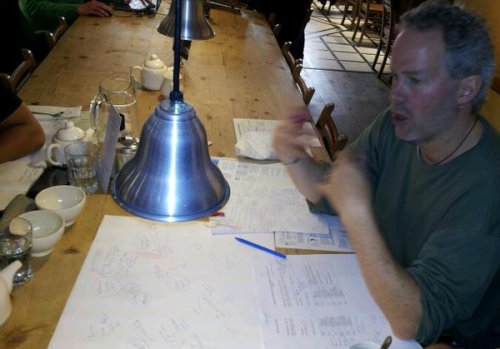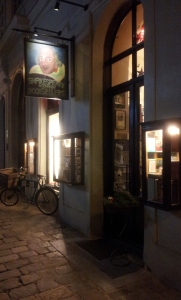
This is an article I wrote for this week’s edition of the Fox Report in The Friend Magazine.
The Friend is the most widely read Quaker magazine in Britain. Its Fox Reports, of which the Democracy unmasked series is the latest, is the magazine’s investigative arm, funded by the Joseph Rowntree Charitable Trust.
Patrick Chalmers reflects on the health of democracy in Britain. He
looks forward to the Scottish referendum, sits in on a Holyrood debate
on growth and hears how 38 Degrees and YouTube are the envy of
conventional politicians.
Public trust in British politicians and the institutions
they inhabit is in tatters – with more than half the
electorate wondering whether to bother turning out
to vote. Yet, despite public disdain for those thrown up
by the Westminster version of representative democracy,
many Britons are far from apathetic about politics itself.
Moves underway in Scotland imply an inevitable
transformation to UK politics. Just how radical a change
lies ahead for the Union?
Scotland’s eligible resident adults, probably including
anyone aged sixteen years or older, will soon get the
chance to wield huge influence over the future of British
politics. On Thursday 18 September 2014 those who do turn
up to vote will answer the simple yes-or-no question: ‘Should
Scotland be an independent country?’
The result will certainly set the speed of Scotland’s
political divorce from the Union but won’t halt
completely a process that is already well set. Yes or
no, the northern partner to a marriage spanning three
centuries is destined to drift further apart from its over-
sized mate to the South.
The Scots have run something of a political marathon
since voting for more devolved powers in the referendum
of 1997. In four elections since, the Scottish national
Party (SNP) has emerged from Labour’s shadow. The
outright majority it won in 2011 cleared the way for a
vote on full independence.
Paying lip service
In a recent television interview the comedian Russell
Brand said he didn’t vote because the system didn’t
represent his views. None of the political choices available
would stop the destruction of the environment or tackle
growing disparity between rich and poor, he said.
Those thinking Holyrood might do things differently
to Westminster, especially on the environment, shouldn’t
hold their breaths. I sat in on a sparsely attended debate
on the Regulatory Reform (Scotland) Bill and all
major parties held standard lines on what ‘sustainable
economic growth’ might mean.
The pioneering book Limits to Growth, published in
1972, showed how exponentially increasing economies
and populations would quickly run into global resource
limits. Today’s politicians, not just in Scotland but across
all those places we lazily dub representative democracies,
pay no more than lip service to the paradox of infinite
growth on a finite planet.
Labour MSP Jenny Marra seemed at first to be fighting
a corner for the ‘Limits to Growth’ perspective. Not,
though, when the SNP’s Derek Mackay challenged her to
say whether her party supported sustainable economic
growth. Of course it did, she said, but not at the cost
of ‘everything else’, which she qualified as meaning
health and safety regulations. So, for all the chat in
Holyrood’s sparkly new chamber, the fundamental issue
lay undisturbed.
Fundamental political reforms
Natalie Bennett, leader of the Green Party for England
and Wales, certainly acknowledges the problem of
disaffection with politics. She’s not ready to give up on
elections though. ‘What happens next if you do that?’
she asks. ‘David Cameron isn’t going to say “all right, I’m
going to give up”.’
The Greens have long backed fundamental political
reforms in the UK. Their policies include introducing a
proportional voting system in place of first-past-the-post
for national elections and replacing the House of Lords
with a wholly elected chamber. They would also establish
a written constitution in place of the UK’s absurd
patchwork of statutes, treaties and court judgments. The
Greens also back economic stability within planetary
resources limits, not growth. The party’s problem is
getting sufficient votes to have an impact.
Bennett won her post as Green party leader in
September 2012 after an election in which just a quarter
of her party’s 12,000 or so eligible members took part.
She secured a majority in the third round on preference
vote redistribution. Those modest numbers compare with
barely more respectable ones for the UK’s three main
parties, which together account for only about one per
cent of the electorate. A parliamentary report published
in December 2012 gave Labour 193,000 members, the
Conservatives between 130,000 and 170,000 and the
Liberal Democrats 49,000.
38 Degrees
Conventional parties would kill for the near-two million
membership numbers enjoyed by 38 Degrees, a political
campaigning organisation aiming to work for positive
societal change, or to have people tune in to their
messages in anything like the millions drawn to Russell
Brand’s Paxman television interview on YouTube (More
than 9.6 million people had watched it by early January).
Maddy Carroll, a campaign director at 38 Degrees,
listed members’ top concerns as protecting the NHS,
finding alternatives to the current economic system,
regulating banks, capping the bonuses of bankers, ending
zero-hours contracts and clamping down on tax dodging
by global corporations. ‘What joins us all together is this
belief in holding those in power to account –
corporations, governments and other entities. Using that
model, we have had a huge amount of success,’ she said.
The organisation, as guided by members, is less
inclined towards fundamental political reform, more
intent on campaigns about policy specifics. 38 Degrees
has had a few stand-out wins by channelling popular
opposition to specific policies. It certainly helped
halt government plans to sell off the national forests
in 2011. Members’ efforts included gathering half a
million signatures against the sale, mobilising a hundred
thousand people to email or call their MPs and raising
the cash for ads and a YouGov poll.
Yet those same members failed to halt the government’s
flagship Health and Social Care Act 2012, which
farmed out large chunks of health care provision to
commissioning groups. Despite the setback, 38 Degrees
members continue fighting government health policies,
in court actions and case-by-case campaigns.
Popular education and empowerment
In these still-early days of mass membership campaigning
groups perhaps their most important work will prove to
be in popular education and empowerment. Carroll
highlights the work done by local 38 Degrees member
groups in pressuring their local MPs, holding meetings
and building networks outside the confines of old-style
party boundaries.
The best of individual MPs, once in office, soon find
the limits to their power and independence. A case in
point is Conservative MP Sarah Wollaston. She won
an open primary in her south Devon constituency and
then election to office in 2010. She has since struggled
for insider influence given her readiness to criticise the
government publicly.
Not all is yet lost, according to Anthony Zacharzewski,
founder of the Democratic Society. His membership
organisation attempts to promote democracy and new
forms of governance by encouraging citizen participation
and bridge-building projects linking the public to those
in power.
On good days Zacharzewski, an ex-Whitehall civil
servant, believes it is possible to radically transform
both the public accountability and transparency of UK
representative democracy. On bad days he’s less optimistic
about chances for orderly change. ‘It’s a much more slow-
burning crisis than people would imagine, it’s more a
hollowing out. The thing I find much more positive is
that there’s still a desire for representative democracy but
people want it to be more representative,’ he said.
What he foresees is something of a transition to mass
participation in decision-making. Perhaps something
that looks a bit like representative democracy but which
involves MPs working in very different ways to how
they do today. All of which sounds reasonable enough
while also being frustratingly far off for all those in
Scotland facing their imminent referendum.
So, will Scots shy away from taking back power over their
political destinies or kick the Unionist can further down
the road until the day reforms crop up for all?
Lesley Riddoch, an author, journalist and commentator,
hopes her fellow Scots will opt for power even though
she’s not yet convinced they’ll dare: ‘No one has been
here before, so who knows?’ Riddoch has her
ears closer to the ground than most, criss-crossing the
country to promote her book Blossom: What Scotland
Needs to Flourish. What she hears consistently is people’s
frustration with politics as usual. ‘They are sick of
platitudes from politicians on either side,’ she says. ‘We
know we are not hearing authentic responses.’
So she ignores opinion polls showing a hefty margin
in favour of the Union. She also recalls the SNP’s record
of repeatedly springing political surprises despite being
ignored, patronised and ridiculed in turn by various
versions of incumbent power. She says: ‘They have done
nothing but pull rabbits out of hats. In 2011, they were
still behind in the polls a couple of months before the
election.’
With three centuries of history on their backs, that
would be some rabbit and some hat.











